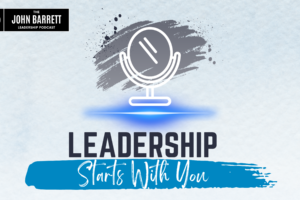One of the hardest leadership skills to master is…successful listening…drop the mic.
Leadership is more than just being in charge; it’s about inspiring and motivating your team toward a common goal. However, this can only be achieved if you have great communication skills, which starts with active listening.
Don’t miss this powerful truth…as a leader, it’s essential not just to hear what your team is saying but to listen and truly understand their perspective. This is where emotional intelligence comes in. Dr. Ralph G. Nichols said, “The most basic of all human needs is the need to understand and be understood. The best way to understand people is to listen to them.”
Let’s explore three ways to listen rather than hear and how developing your emotional intelligence can unlock your full leadership potential.
I call it The Successful Listening Zone.
Intention
The first step in becoming a better listener is to be intentional. As a leader, you must take the time to connect with your team and be fully present. This means carving out time on your calendar to listen to those around you. By intentionally spending time with your team, you create an environment that encourages open communication and fosters trust and respect. When employees feel heard and valued, they are more likely to work harder and become more productive.
Intention Tip:
Reverse Roles
Empathy is one of the key components of emotional intelligence. It’s the ability to put yourself in someone else’s shoes and understand their perspective. As a leader, it’s important to listen and respond to your team’s needs actively. By putting yourself in their shoes, you can better understand their challenges and work collaboratively towards solutions. This fosters a supportive work environment and boosts morale.
Attention
The second critical aspect of active listening is giving your full attention to the speaker. This includes making eye contact, maintaining good body language, and mirroring their statements to show you understand their perspective. By giving your undivided attention, you show that you value their input and are genuinely interested in what they have to say. Additionally, this can help you learn more about your team members, their ideas, and how you can support them better.
Attention Tips:
Listen To The Tone
The tone of voice can convey so much more than the actual words spoken. As a leader, pay attention to your team’s voices’ pitch, pace, and intonation. Is there a sense of urgency? Is there frustration or concern? By listening to the tone of voice, you can pick up on the emotional state of your team and respond accordingly. This builds trust and strengthens your relationships with your team.
Observe Body Language
Nonverbal communication often speaks louder than words. When someone is speaking to you, pay attention to their body language. Are they slouching or sitting up attentively? Are they making eye contact or looking away? By observing body language, you can detect underlying emotions and potential issues that may need to be addressed. It’s also important to be mindful of your own body language as a leader, as it can influence how your team perceives you.
Intervention
Finally, effective listening requires taking action and getting involved in the conversation to move it forward. As a leader, you are responsible for asking questions, clarifying misunderstandings, and providing feedback. By intervening, you can ensure that the conversation stays on track and everyone involved feels heard and understood. Additionally, this allows you to identify potential issues before they become more significant problems and take steps to resolve them proactively.
Intervention Tip:
Curiously Ask Questions
Asking open-ended questions is a great way to gain insight into your team’s thoughts and opinions. Ask open-ended questions that elicit thoughtful responses rather than just asking yes or no questions. This shows your team that you value their input and creates a space for dialogue and collaboration. Encouraging your team to share their ideas and feedback opens up new opportunities for growth and innovation.
Active listening is a crucial skill that every leader must possess. By following this framework, you can connect with your team, build stronger relationships, and become more effective in your role. As a leader, it’s essential to remember that communication is about speaking and listening. By becoming a better listener, you can create an environment that encourages open communication, fosters trust and respect, and leads to greater success for your team and organization.
As the great Winston Churchill once said, “Courage is what it takes to stand up and speak; courage is also what it takes to sit down and listen.”









